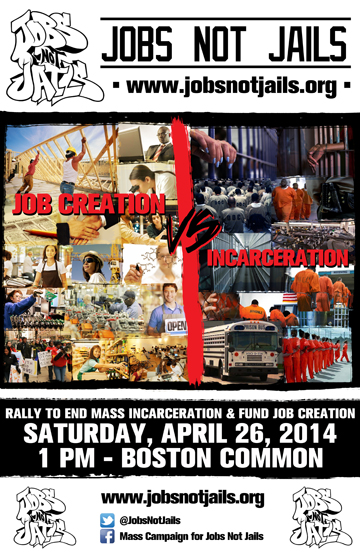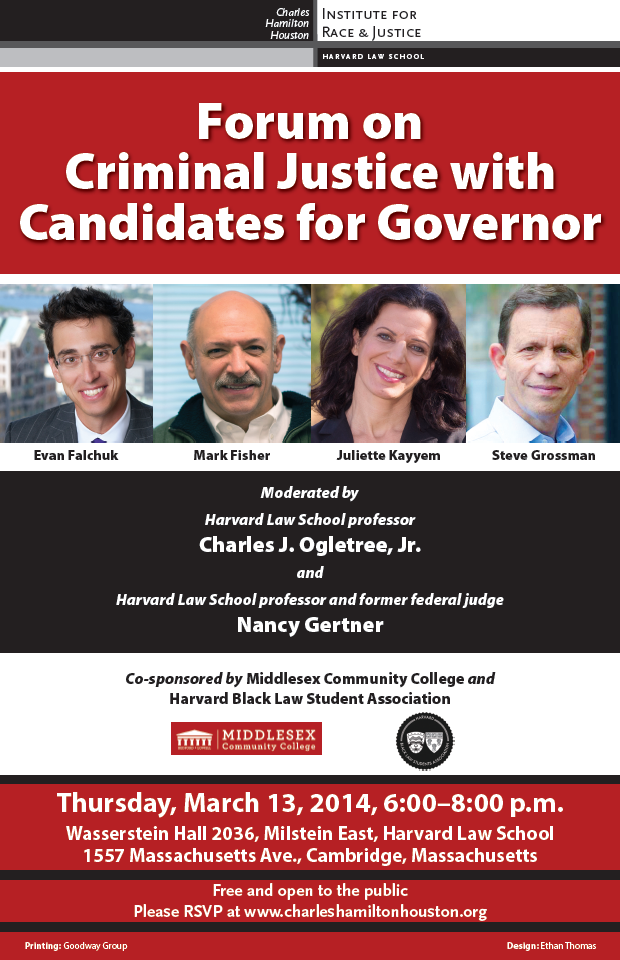12:30 Music from the Second Line Brass Band
1:20 MC Cassandra Bensahih, Ex-Prisoners & Prisoners Org. Comm. Advancement
1:23 Sunni Ali, Boston Workers Alliance,
1:27 Viraphanh Douangmany, Innocence Commission
1:31 Andrea James, Bail Reform
1:35 Ivan Richiez, Stop and Frisk
1:39 Donnelle Wright – Jobs Not Jails
1:43 Maura Healey, Candidate for Attorney General
1:48 Music from Antonio Ennis
****APRIL 30 LOBBYING PRIORITIES FOR JNJ:
2:00 Mandatory Minimums
2:04 RMV Collateral Sanctions – EPOCA
2:08 Addiction Funding – Massachusetts Org for Addiction Recovery
2:12 Music by Revolutionary Snake Ensemble
2:32 Keturah Brewster, Youth Jobs Coalition
2:36 Manny Gines & Rocky Thompson, Carpenters’ Union on Minimum wage
2:40 Cassandra Bensahih, CORI Reform
2:50 Larry Turner, math teacher and father of a murder victim
2:55 Warren Tolman, Candidate for Attorney General
3:00 Music by Tem Blessed
3:15 CeCe McDonald, activist/trans woman incarcerated in men’s prison
3:20 Rev. Paul Robeson Ford, Union Baptist Church
3:25 Shackling
3:30 Black and Latino Legislative Caucus speaker -kicks off April 30th Action
3:35 Music
****INSTRUCTIONS FOR APRIL 30th LOBBYING
 __________________________________________________________________________
__________________________________________________________________________
Yesterday, at the State House, three fantastic panels testified to the Judiciary Committee on issues that they would like to see addressed. While JNJ has certain legislative priorities, and is approaching lobbying in their own way, these panels were activism in action. People spoke eloquently about other bills, but the organization and effort put into these panel testimonies was most impressive.
FAMM or Families Against Mandatory Minimums led by Barb Dougan in Massachusetts spoke passionately to do away with mandatory minimum sentencing, represented by two bills, H1645 and H1646.Dougan said “Too many people go to prison,” and sentences “are not proportionate with criminal history.” Two recovering addicts talked about how they transformed their lives but that they could have begun much earlier if they had immediately had alternatives to mandatory sentencing. Both other panelists, Maryann Frangules from Massachusetts Organization for Addiction Recovery, and Jerry Madden, former Texas House Corrections Chairman and senior fellow at Right on Crime, rounded out the panel from very different ends of the spectrum: but both said drug treatment was the answer not incarceration.
Barb Dougan, center, flanked by panelists and members of FAMM, standing
A panel sponsored by the Pretrial Working Group (PWG) knocked it out of the park. It began with Lois Ahrens of the Real Cost of Prisons Project recommending elimation of money bail because of it not being a true determinant of dangerousness. As an alternative, she suggested statewide pretrial services and referrals to community based programs. Hope Haff of the National Association of Social Workers said the PWG was against H1434 since it was about building a new jail for pretrial women: remaining in jail for two months caused loss of housing, custody, inability to pay rent and many other services. Additionally, Norma Wassel, Committee for Public Counsel, pointed out that a large scale study showed that those held in jail pretrial were four times more likely to be sentenced to jail and three times more likely to go to prison. Rachel Roth, reproductive justice scholar, pointed out the harm jails inflict on women’s health including “diet, risk of sexual assault, mental illness, and birthing issues.” She said, “Instead of building new jails we can reduce number of women in custody.” The expertise of all these women was quite wonderful.
Andrea James of Families for Justice and Healing was last, but certainly not least. She said as a “formerly incarerated woman, “I am often the missing seat at the table,” and immediately grabbed everyone’s attention. It cannot be emphasized enough, she added, that separating mothers from children causes grievous harm. She, along with the rest of the panel recommended community based health and treatment —not jail. Prison seldom rehabilitates,she said.
I don’t see us building more prisons in the near future, said Judiciary Committee Vice-Chair, Christopher Markey. That was a breath of really fresh air in a long afternoon in a hot room with little response from listeners—Not a criticism, it is their job to listen at this point before they make decisions. Let’s hope Markey can make sure the Legislature agrees!
The final panel that was an wonderful example of diverse voices speaking for a cause was on solitary confinement. The bill in question was H1486 and Attorney Bonnie Tenneriello at Prison Legal Services spoke eloquently on why adjustments to solitary are so needed in Massachusetts since as it is, without certain regulations, it is “bad for public safety.” Beth McGuire talked powerfully about her son held in solitary, very tortured by isolation: “I’m scared of being alone all the time…I really need some help…send me somewhere…I need something to occupy my time.” And most expertly, Kristin Dame, a former clinical coordinator from Cedar Junction testified on how infamous segregation confined people with no limitation, breeding violence. She said that being “deprived of human contact really can destroy a person,” and explained how in isolation, “People driven to self harm.” She recommended limiting solitary and incentives to help prisoners earn privileges such as time in the yard. Some important details of the bill: “Segregated housing should be for the briefest term and under the least restrictive conditions practicable….”
For anyone who wants to know about solitary confinement in the U.S., see Solitary Nation. Gruesome but eye-opening.
These panels were examples of how we must approach getting change, and examples of activism at its best. Let’s hope the continued momentum and added energy from Jobs Not Jails creates more people speaking out for justice.


